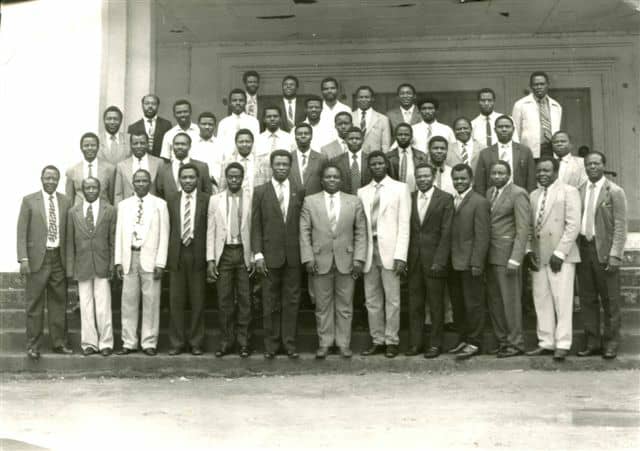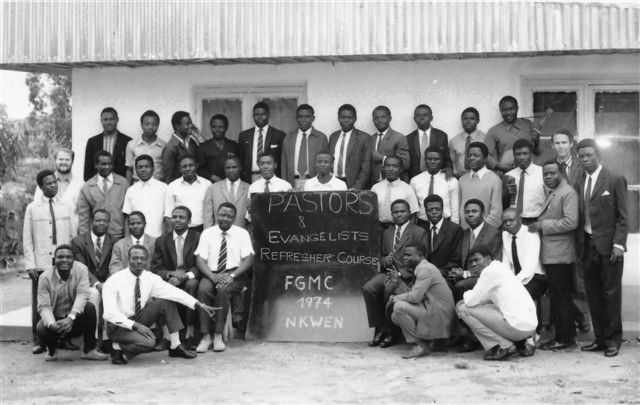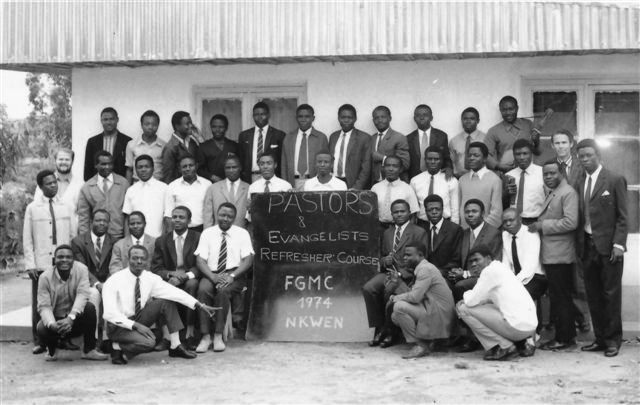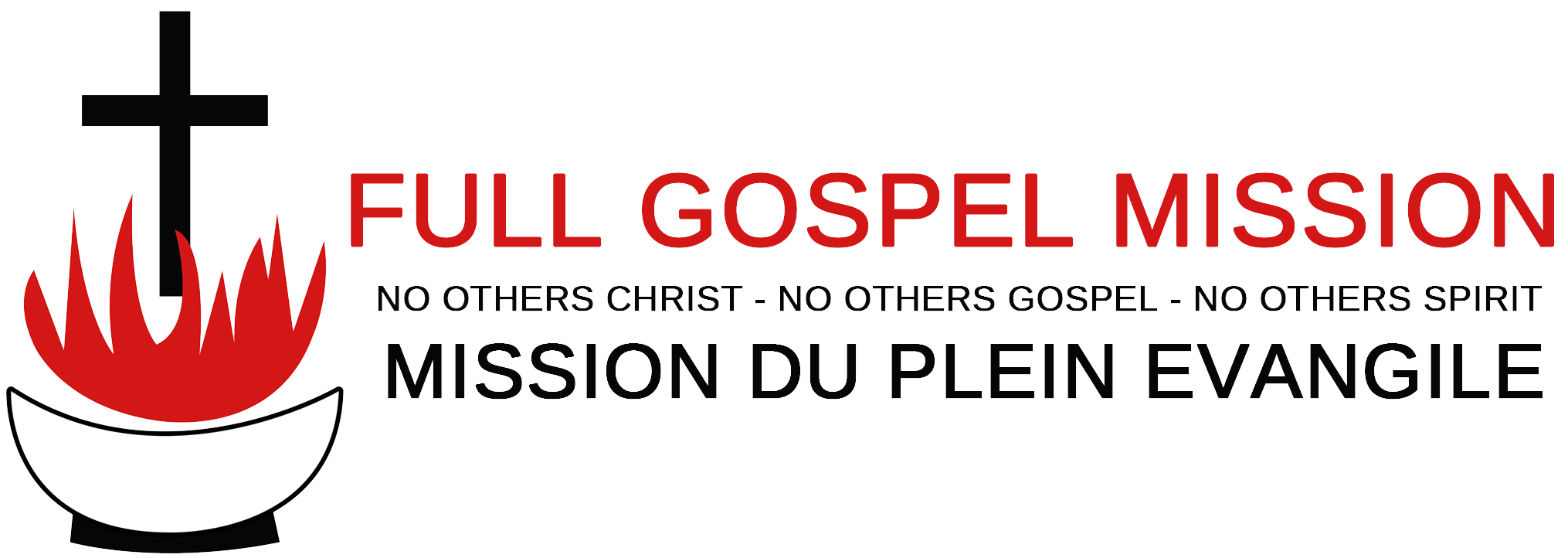RETRACING OUR ROOTS
Rev. & Mrs Werner KNORR, Pioneer Missionaries


No others Christ – No others Gospel – No others Spirit
RETRACING OUR ROOTS


MISSIONARIES
The Full Gospel Mission Cameroon officially began in 1961.
As my wife, Helga, and myself happen to be the founding missionaries of FGMC, let me start with a brief testimony of our early life. Both of us are Germans and were born shortly before, and grew up as children, during the Second World War. We experienced great hardship as refugee kids, but God held His protecting hand over our young lives, so that we did not suffer any major harm.
My wife gave her life to the Lord at the age of 17 and I at the age of 14, during an evangelistic campaign of a Pentecostal church from a neighbouring village. My experience was very real and lasting, and as the church that conducted the campaign belonged to a mission group called “United Mission Friends”, my young heart was awakened to a missionary call from my youth.
China and Tibet had been our mission’s outreach before the War, so being part of this mission, my mind too was directed to go to that mission field. However, in the “forties” China had succumbed to Communism under Mao Tsetung and the door for missionary activities had been closed. In 1956, I went to a Bible-school in Château d’Oex, Switzerland, to prepare more fully for my missionary career. It was here that I came to know my future wife. In 1958, while still under training, I received a letter from my youth leader in Germany, enquiring whether I would be willing to join an elderly missionary in Nigeria to help him in his work. This was somewhat abrupt, besides the fact that I was very young. However, I placed the matter before the Lord in prayer and I received a very definite answer from Him as He spoke to me from 1 Chron.28:20-21: “Be strong and of good courage, and do it; do not fear nor be dismayed, for the Lord God will be with you. He will not leave you nor forsake you, until you have finished all the work for the service of the house of the Lord.” It was an answer and a promise from God that most certainly has become true throughout the past years.
So in 1959 I travelled to Nigeria, to Uyo in the South Eastern State, as it was called at that time. I was still single by then; my fiancée was undergoing some nursing training in Germany. There in Nigeria, I had my first experiences on the African mission field. I look back to them as an adventure with God: God leading and teaching me and proving His faithfulness to me having trusted Him. I used to preach in different Pentecostal churches and hold Bible-classes in training courses. It was a formative period in which contacts were made with young African brethren who would help later on in the new outreach in Cameroon.


What made us come to Cameroon ? Our home-mission’s policy for oversees mission work was, “not to build on another man’s foundation”, as was also Paul’s ambition. Moreover, the South-Eastern State of Nigeria was already quite saturated with churches, including Pentecostal ones.
So following the advice of a fellow missionary, I made an exploratory trip by canoe in 1960 to the then “Southern Cameroons”, which was administered as a mandatory territory under the League of Nations by the British. The official language was English. Embarking at Oron I came to Obenekang, a fishing village on the Atlantic Ocean, and went on from there to Tiko and Kumba. It was this trip that determined our home mission’s later involvement in Cameroon, as we realized that the country still needed to be evangelized in spite of the presence of the major denominations, such as the Catholics, Presbyterians and Baptists. Pentecostal churches were almost none-existent at that time. And I, on that exploratory trip, felt God’s approval on the vision and the proposed missionary endeavour.
After Nigeria had received its independence from its colonial masters in 1960, I returned to Germany and got married to my dear wife, who had completed her training by then. In June 1961, we set out as a couple to Cameroon, via Lagos. We settled for two years in Mutengene, close to Limbe, where we started the work of evangelism and of laying the foundation of the Full Gospel Mission.
Towards the end of the year 1961, we held our first Bible training course at Mutengene, with young Christian men – all of them were Nigerians -, who had come from churches in fishing villages along the Atlantic coast close to Tiko. Two of them, O.E.Onukak and Asuquo Okponung became later on pastors in the newly founded churches. Three more pastors from churches in Nigeria, I had been in contact with while there, came to also assist in the newly founded work; among them was E. Williams, whom God used for many years to pastor churches in our work and also as a Bible-school teacher (before returning to his country to help start a new work in the Benue State). The Bible training courses were continued annually until the founding of our permanent Full Gospel Bible Institute at Bamenda in 1970.
Another stepping stone in the establishing of FGM in the country was the construction of the Yoke-River Mission Station in 1963. Somewhat later the first FGM headquarters was built in the Stone Quarter of Muyuka and in 1969 the Mission was officially recognized by Presidential Decree as a religious association with full rights to operate in the country. The Mission’s first Board of Trustees was recognized by the Ministry of Territorial Administration in 1970. The post of Mission Superintendent was held by me at that time. It was in 1979 that Rev. D. N. Njemo took over this duty.



There had been a strong evangelistic drive in the work from the very beginning. It was God, who had put it in the hearts of His people. From the coastal region evangelistic outreaches were made already in the sixties to the grasslands in the North West and to Douala, as the work expanded. The gospel message was carried by young Cameroonian brothers to their home areas, assisted also by more overseas missionaries like Rev. & Mrs. Schaible, Rev. & Mrs. Collins, Rev. & Mrs. Schneider, and later Rev. & Mrs. Scheven.
Side by side with evangelism continued the training of young men who felt a calling into full-time ministry. In 1969, my family and I moved from Muyuka up to Bamenda, where we constructed another mission-station and then in 1970 built the Full Gospel Bible-Institute. A thorough Bible training has been going on in this institution ever since, with the result that more than 900 students have been trained over the years. They constituted a strong force to spread the gospel near and far, even to other countries.
The question might arise, “Did we never meet any obstacles, hindrances on our way of expansion? Of course, we did. There were those who considered the Mission a sect, although we try to strictly abide with the written Word of God, as our name indicates. There were also clashes with African traditions, where the gospel seemed to cut sharply across the worship of dead ancestors or idols. At times we experienced outright hostility, to the point w h e r e Christians were attacked and church houses destroyed. But on the long run, God prevailed. The Lord Jesus said, “You shall know the truth, and the truth will set you free.” Persecution often resulted in a real break-through of the gospel and revival, especially among the younger generation.
There were at times also set-backs in our own circles, when believers fell into sin or pastors diverted from the gospel that was “delivered to the saints once for all”. Some started to preach and practice a modern-style gospel, which is being propagated by so many local and foreign ministers in our time.
May the vision which
we had at the beginning when we named our new work “Full Gospel Mission” be ever binding for us, that is, to firmly stand on the gospel which was the foundation of the early church: a gospel that saves, heals, sanctifies and leads to full maturity. After having looked back to our past years, what is our outlook for the future? We cannot fold our hands as yet, as though the work was already done. There is still much territory to be occupied for the Kingdom of God. Many lost souls are still to be saved and much spiritual upbringing to be done of those who are already in the churches. In terms of our stay in Cameroon we have reached our Golden Jubilee, but as to fulfilling the divine program much still needs to be accomplished.
In closing this article, permit me to refresh God’s vision for Cameroon. Quoting from our 40th anniversary booklet, the passage reads: “It was in the seventies that Steve Lightle, a well-known minister of the world-wide charismatic movement in Europe (who later on became president of “Full Gospel Business Men” of Europe) purposely visited Cameroon, because God had shown him and his group of believers at Braunschweig in Germany (during a prayer meeting) a vision of the African Continent where the map of Cameroon was brightly lit up.
When here, whilst fellowshipping with various Christian groups, this brother found his vision yet confirmed by another similar one. He was told that praying believers in Finland were shown the African Continent in a vision, with a finger pointing expressly to the country of Cameroon. Comparing these revelations with the original promises given to me and my wife as pioneering missionaries of the Full Gospel Mission when we first set out for our mission field, I am profoundly convinced that this is indeed God’s end time plan for this country.” Let us hold fast to this original vision, let us pray and labour that the purpose of God will be worked out in Cameroon!
© 2024 Lunno. All Rights Reserved.
